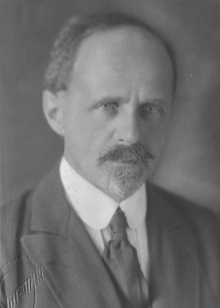Władysław Konopczyński

Władysław Konopczyński (26 November 1880, Warsaw – 12 July 1952) was a leading Polish historian[1] and publisher of primary-source materials.[2]
Life
Konopczyński was a student of Polish historian Szymon Askenazy.[3] He became a professor at Kraków's Jagiellonian University (1917) and a member of the Warsaw Scientific Society (Towarzystwo Naukowe Warszawskie) and the Polish Academy of Learning (Polska Akademia Umiejętności, 1922).[2]
Konopczyński's chief interests were Polish parliamentary history, 17th- and 18th-century Polish politics and political thought, and the Bar Confederation. He wrote histories of Poland and of the modern world.[1]
In 1931 he founded Polski słownik biograficzny (The Polish Biographical Dictionary) and served as its first editor, seeing seven volumes through press, 1935–49, before being forced by Poland's postwar communist government to resign his editorship.[1][2]
During World War II, Konoczyński survived German imprisonment at Sachsenhausen concentration camp.[1]
After the war, he was removed from all his academic and scholarly posts by Poland's communist government.[1]
Konopczyński was a recipient of the French Légion d'honneur.
Works
His chief works included:
- Polska w dobie wojny siedmioletniej (Poland during the Seven Years' War, 1909–11);
- Liberum veto (1918);
- Dzieje Polski nowożytnej (History of Modern Poland, 2 vols., 1936);
- Konfederacja barska (The Bar Confederation, 1936–38);[1]
- Kwestia bałtycka do XIX wieku (The Baltic Question to the 19th Century, 1947).[2]
See also
- List of Poles
Notes
References
- "Konopczyński, Władysław," Encyklopedia Polski, Kraków, Wydawnictwo Ryszard Kluszczyński, 1996, p. 305.
- "Konopczyński, Władysław," Encyklopedia powszechna PWN (PWN Universal Encyclopedia), vol. 2, Warsaw, Państwowe Wydawnictwo Naukowe, 1974, p. 539.